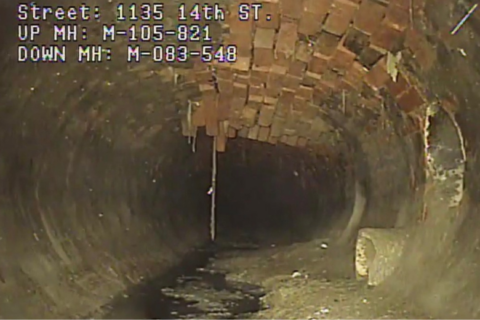A new report from the D.C. Auditor says internal oversight practices at the troubled D.C. crime lab were broken and ineffective long before the lab lost its accreditation last year.
But the report also finds fault with federal prosecutors and the D.C. Office of the Attorney General for going outside that process to launch an investigation that later turned up evidence of serious misconduct by lab personnel.
The report, published Dec. 1, comes as the D.C. Council prepares to take a first vote Tuesday on a bill overhauling the forensic agency.
The report concluded the D.C. Department of Forensic Sciences has failed to live up to the ideals of an independent forensic science lab — one that is not situated within a law enforcement agency — that District lawmakers envisioned when they created the agency in 2011.
The lab, which lost its accreditation to perform all forensic casework in 2021, has been unable to process evidence since then and has been outsourcing DNA, firearms and other evidence to outside labs.
D.C. Auditor Kathy Patterson said the roots of the problems at the lab stretch all the way to the creation of the agency, when the District failed to provide enough funding or staffing support for an internal review board, called the Science Advisory Board, which was supposed to oversee the lab.
The board “had flaws from the outset,” Patterson said. “One of the big problems with the Science Advisory Board was it was given enormous responsibility and no resources.”
By law, the board is supposed to investigate complaints and allegations of misconduct and testing errors, but as a result of regulations pushed by former agency leadership and approved by the D.C. Council, the agency director was given the final say over what issues the board could look into.
“The council was complicit in that,” Patterson said.
In other cases, the agency director had the power to classify some allegations brought to the agency’s attention as “inquiries” rather than “complaints,” which meant they were not fully investigated. One of those was an allegation brought by a “concerned juror” in a D.C. criminal case, who wrote to the agency that DFS’ failure to test a gun may have led to a hung jury in the case.
Report also criticizes prosecutors
Prosecutors with the U.S. Attorney’s Office and the attorney general’s office are also criticized in the report — for “circumventing” the very same oversight processes that the auditor acknowledges were dysfunctional.
The report stated the two prosecutors’ offices “bypassed the established processes for handling complaints and allegations and conducted unilateral audits and investigations of the laboratory firearms examination units over testing errors and allegations of misconduct.”
The report concluded: “These unilateral investigations undermined the independence of the agency.”
Patterson said there’s blame to go around — prosecutors should have worked more collaboratively with the agency after it uncovered problems and D.C. Mayor Muriel Bowser could have stepped in to provide more leadership around the situation.
Patterson acknowledged, however, that her office’s audit, which contains only vague references to the events leading to the lab’s loss of accreditation, doesn’t grapple much with the actual misconduct prosecutors say they uncovered.
“These are not issues that we went into at all in our audit,” Patterson said. “We were looking strictly at the legislation” that created DFS.
AG: We uncovered ‘corrupt management’
D.C. Attorney General Karl Racine said prosecutors’ probe uncovered “corrupt management, inaccurate information regarding the results of scientific testing, and efforts to cover-up the lab’s failings” that forced them into taking action.
“In 2020, our office raised concerns about the integrity of the lab and its ability to support public safety, but those concerns were not addressed by the lab and instead were brushed aside,” Racine said in a statement.
A statement from the U.S. Attorney’s Office for D.C. on Friday also rejected the auditor’s conclusions about prosecutors’ role.
“The DC Auditor’s Report outlines the many ways the institutional oversight options at DFS were ineffective but then, incredibly, faults USAO and OAG for not relying on those same ineffective options,” according to a statement provided by office spokesman Bill Miller. “Without the work of the independent auditors retained by USAO and OAG, the serious issues that led to DFS’ loss of accreditation may never have been discovered.”
‘These were problems of DFS’ own making’
As laid out in court filings, prosecutors notified the lab in January 2020 that, while preparing to take a case to trial, an outside examiner had reached a different conclusion on ballistics evidence. Specifically, while DFS examiners had concluded that cartridge casings from two different crime scenes were fired in the same gun, the prosecutors’ expert came to the opposite conclusion — that the casings didn’t match, and therefore, the evidence that prosecutors were about to use at trial was faulty.
When prosecutors notified DFS of the error, lab leadership at first denied fault, claiming prosecutors had tested the wrong evidence. In fact, that was incorrect. Months later, when a DFS firearms supervisor retested the evidence, the lab finally acknowledged an “administrative error” and said the finding should have been classified as “inconclusive,” meaning examiners couldn’t say whether the casings were fired in the same gun.
It was around that time that prosecutors assembled three experts to audit the lab.
Later, as a result of documents obtained through a subpoena, it was revealed that the firearms supervisor who, ultimately, claimed a finding of “inconclusive” initially agreed with the outside expert that the casings didn’t match. However, that finding — which was only presented in a PowerPoint for senior leaders — was never disclosed outside the agency. Instead, senior managers held another meeting and decided to report a finding of “inconclusive” to the lab’s accrediting board, in an apparent effort to minimize the extent of the error.
In addition, there was evidence that one examiner felt pressured by his boss to change his conclusion.
The ANSI National Accreditation Board pulled DFS’ accreditation to perform all forensic casework in April 2021, saying the report from the prosecutors’ experts was credible evidence the D.C. crime lab had “engaged in misrepresentations and fraudulent behavior.”
The statement from federal prosecutors went on to say: “Both the DC Auditor’s Report and DFS’ leadership at the time it lost accreditation misunderstand what ‘independence’ means in this context. Independence does not mean that DFS can operate independent of sound scientific principles or what courts require … These were problems of DFS’ own making. Faulting prosecutors for uncovering the problem and disclosing it to defendants and the Court as constitutionally required is asking prosecutors to prioritize process over the integrity of the criminal justice system.”
Vote coming on DFS overhaul
The D.C. Auditor’s report calls for a number of changes, including greater budgetary support for the internal oversight board.
Patterson said she was heartened to receive comments from the Office of the City Administrator, pledging to provide necessary resources to support a more robust Science Advisory Board in the next budget cycle.
A bill proposed by D.C. Council member Charles Allen would make a number of structural reforms to the agency, including creating a new position of chief forensic science officer, and strengthening the powers of the science advisory board, which would be renamed the Science Advisory Review Board.
That bill is set for a first vote in the full council on Dec. 6.








